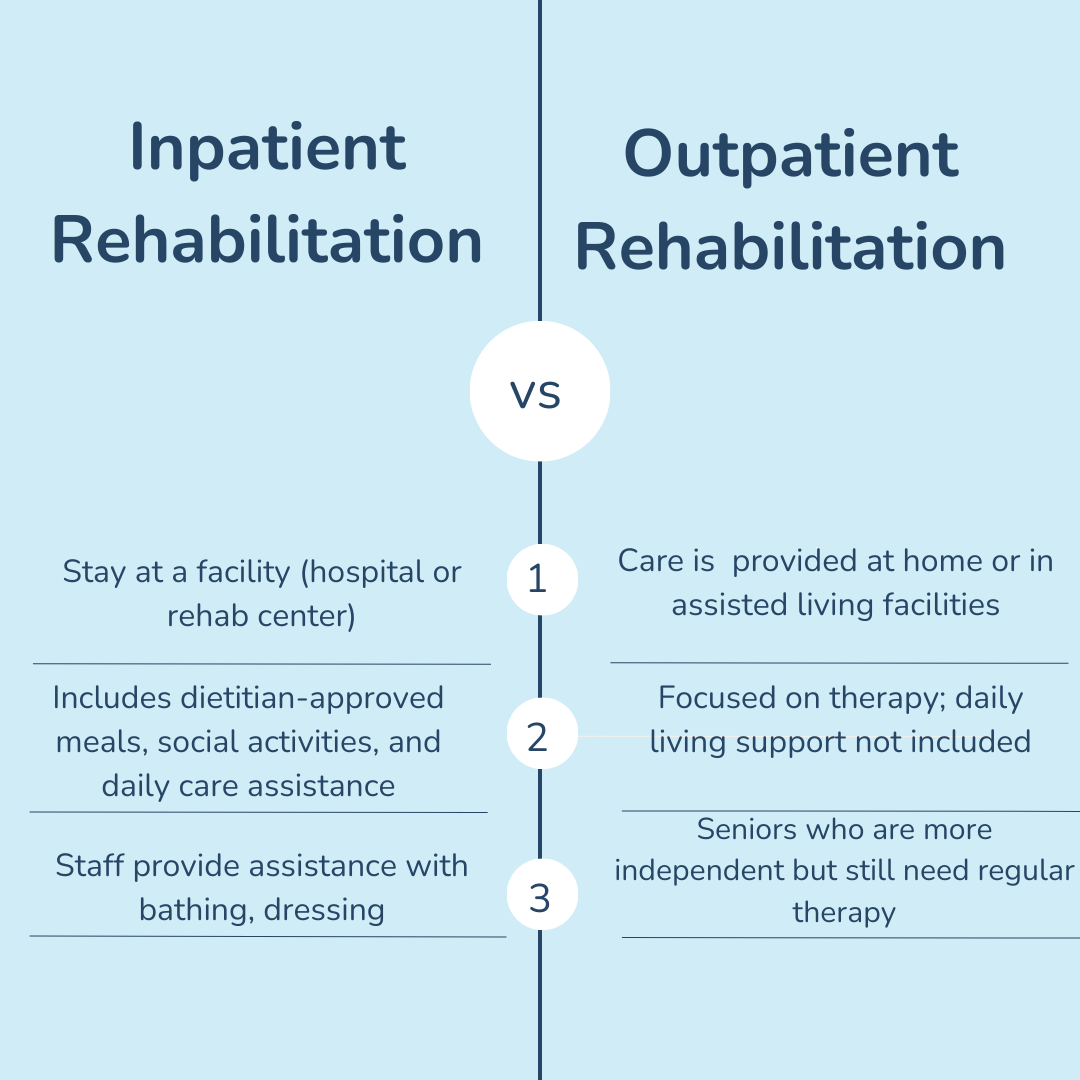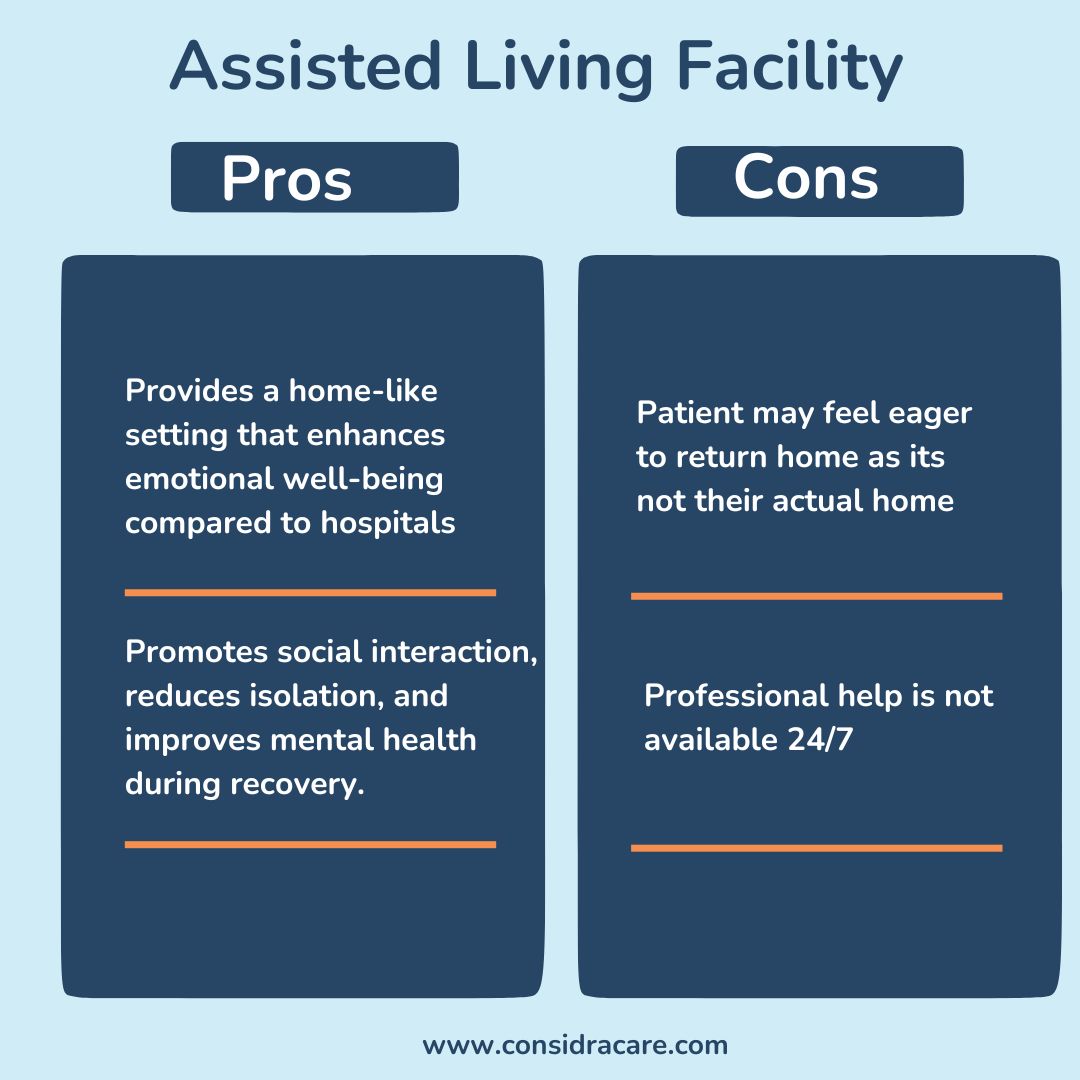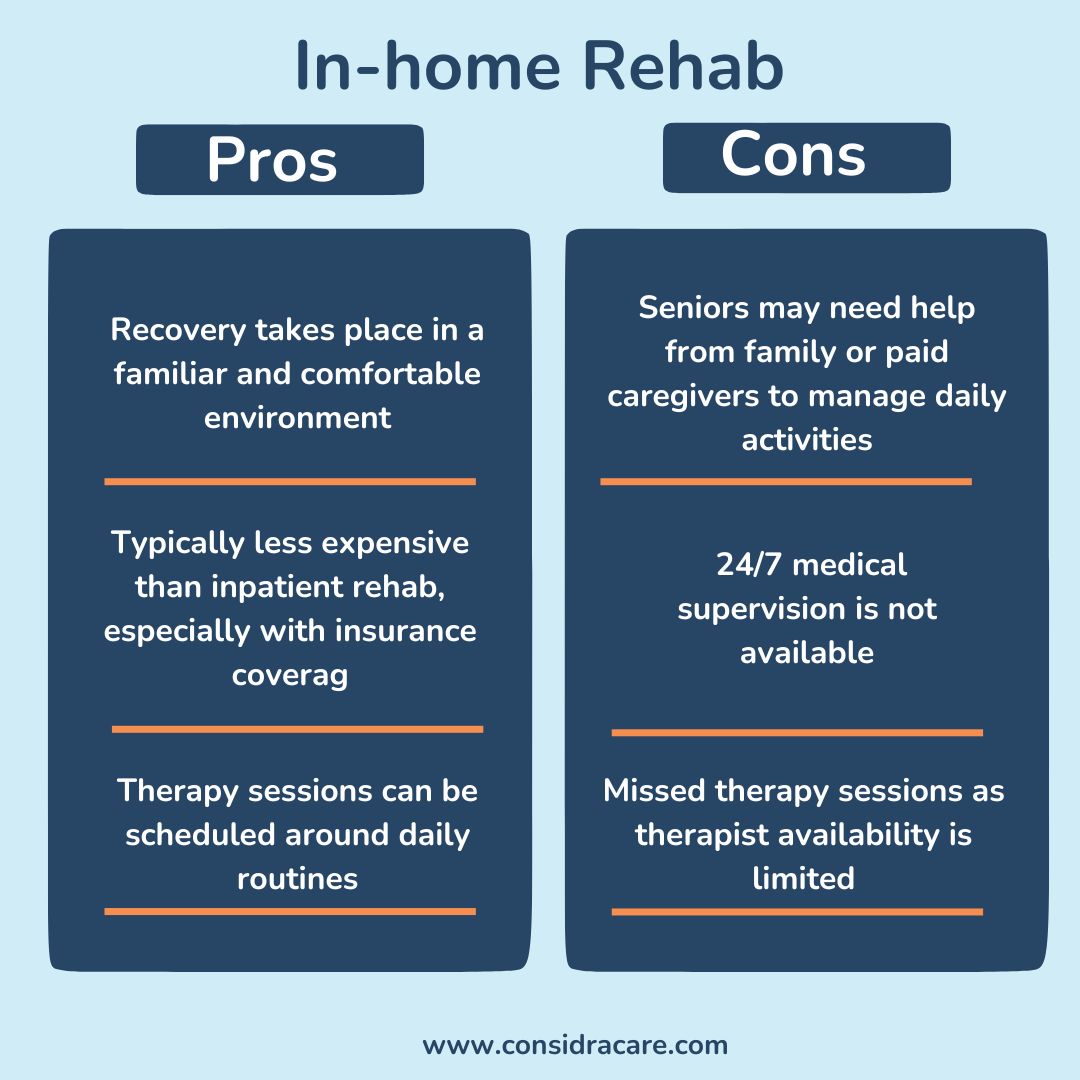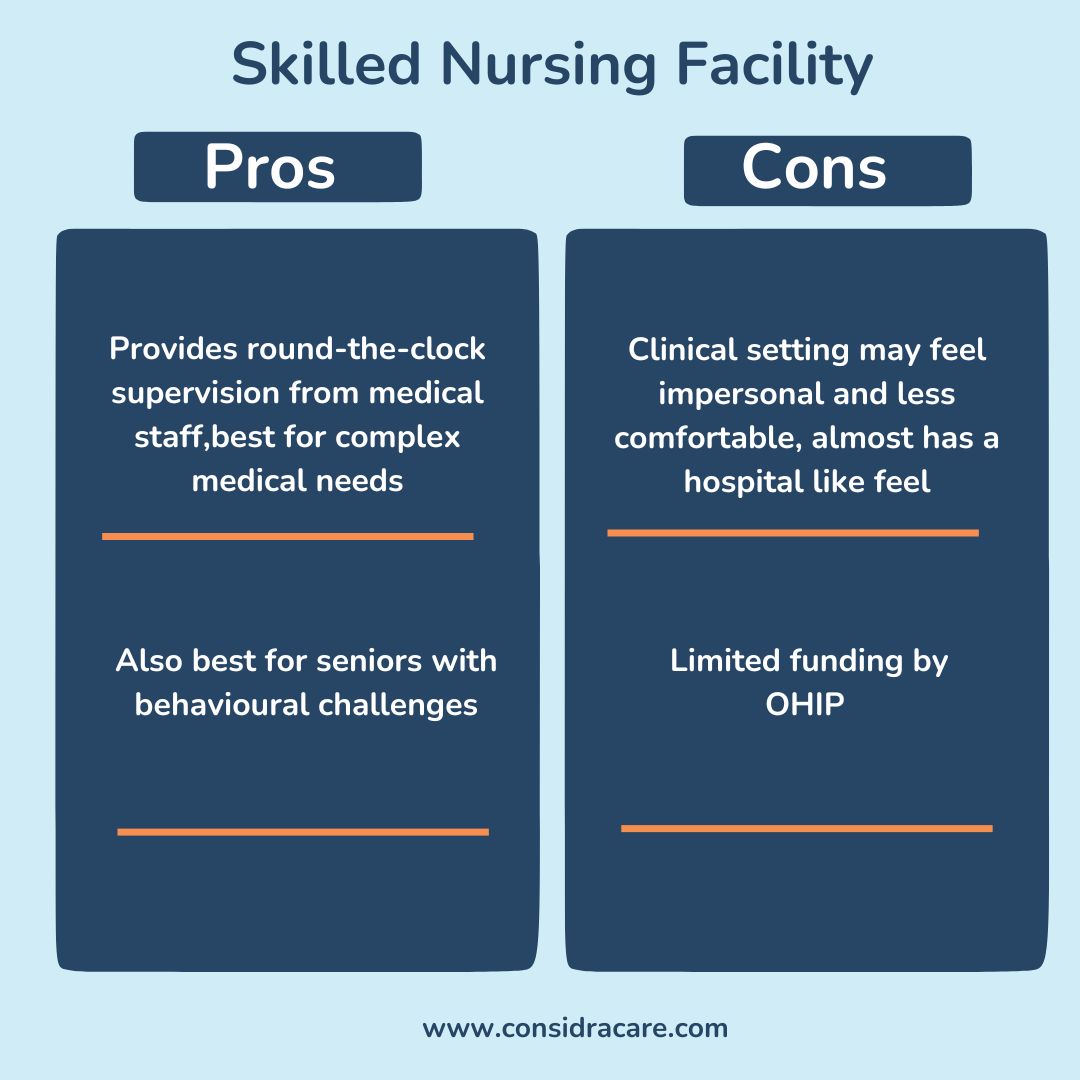What Is Senior Rehab?
Senior rehabilitation is specialized care designed to help older adults recover from surgery, illness, or injury. It focuses on restoring physical, cognitive, and emotional abilities, enabling seniors to regain independence and improve their quality of life.
Services include:
Rehabilitation typically includes;
- Occupational therapy for daily tasks (ADL’s)
- Physical therapy for mobility, balance, and strength (recommended after serious injury and can be done for chronic conditions like arthritis)
- Speech therapy (if there are issues with communication or swallowing) typically recommended after a stroke, illness, or injury that affects the brain
Other medical conditions that require rehab;
- Hip replacements
- Strokes
- Chronic conditions like heart disease, arthritis, Parkinsons, cancer
Inpatient Vs Outpatient Rehab:
When you’re helping a loved one recover from a major surgery, injury, or illness, understanding the right rehabilitation option is crucial. Here we will give you a clear concept of both.
1. Outpatient Rehab:
Outpatient rehab is designed for seniors who are well enough to continue their recovery from home or another living arrangement, such as an assisted living facility. It allows patients to visit a rehabilitation center for scheduled therapy sessions, typically several times a week. It’s ideal for seniors who still need support but are independent enough to manage most of their daily activities without continuous supervision.
2. Inpatient Rehabilitation:
Inpatient rehab is designed for individuals who need more intensive, round-the-clock care. If your loved one is recovering from a serious injury, illness, or major surgery, this might be the best option. Inpatient rehab facilities provide a structured environment where seniors stay at the facility for a period of time, typically ranging from a few days to several weeks.
This type of rehabilitation includes daily therapy sessions, such as physical, occupational, or speech therapy, all aimed at helping patients regain their strength and independence. On top of medical care, these facilities often provide additional services like:
- Meals planned by dietitians to support nutrition.
- Exercise classes and social activities to promote both physical and mental well-being.
- Counseling services for emotional support during recovery.

Long-term Vs Short-term Rehab:
Some senior rehab centers offer long-term and short-term stays, but what suits your loved one the best will be determined by their health requirements.
Minor surgeries or injuries will require your loved one to stay in short-term rehab as they focus on regaining independence and quick recovery through intensive therapy over a few days or weeks.
However, for more chronic or serious conditions, such as after a stroke or with ongoing heart issues, long-term rehab may be necessary. This form of rehabilitation can last several months and is typically provided in a skilled nursing facility that offers 24/7 care to manage more complex medical needs.
Duration of Stay:
You may wonder how long your loved one will need to stay in a rehab facility. There is no set timeline, as it depends on their overall health, the seriousness of their condition, and how well they are recovering. If they are healing quickly, their stay might be shorter.
Work with their doctor to determine the best course of action. Together, you can decide if your loved one will reach their recovery goals in a skilled nursing facility or through another rehab option.
Avail new client special offer, only $33.99 / hour for the first month
Senior Rehab at Assisted Living Communities:
When you’re considering care options for your elderly loved one, you might wonder if assisted living communities can also support rehabilitation needs. The good news is that many assisted living communities provide rehabilitation services and not many people know about it.
The assisted living facility offers a warm, home-like environment that encourages both social interaction and recovery. In addition to benefiting from therapy, your loved one can engage with others, which enhances their emotional well-being. For seniors who may not feel ready to return home, a short-term respite stay is a great option. This provides peace of mind by ensuring 24/7 care is available to assist in any emergency.

In-home Rehab After Hospital Stay:
In-home rehabilitation allows elderly individuals to receive professional therapy and medical care in the comfort of their own homes. It is provided by licensed medical professionals who perform specific tasks as advised by physicians. This includes;
- Monitoring vital signs
- Administering medications
- Managing wounds or other medical conditions
- Providing therapy sessions (physical, speech, occupational)
Home rehab therapy can be provided 3 times a week. so it means the patient must follow some exercises on their own to maintain the effect. In-home therapy as good as it sounds, might lack social and professional support that can be seen in skilled nursing or assisted living facilities.
Ideal Candidates:
- Seniors who are medically stable but need continued therapy to regain strength.
- Individuals who prefer to recover at home rather than in a facility.
- Those with a good support system or family nearby to assist with daily activities.

Elderly Rehab at Skilled Nursing Facility:
Skilled nursing facilities, also known as rehab hospitals, provide short-term housing and rehabilitation services for individuals who require 24-hour medical care and specialized nursing services. These facilities are designed for those recovering from serious illnesses, surgeries, or injuries, offering comprehensive care in a clinical environment. Typically, the setting includes hospital beds and shared rooms, along with services such as meals, dietary counseling, and social activities to support recovery.

What You Should Ask the Doctor Before Hospital Discharge?
When discussing your loved one’s hospital discharge plan, it’s essential to ask the right questions to ensure a smooth transition to the next phase of care.
- What follow-up care will be needed?
- Will my parent need help with daily activities? if yes then how long ?
- What is the average period of recovery of someone with their condition?
- What medications will they need?
- Will they require special medical equipment at home?
- What are the warning signs of complications?
- Is home care or rehabilitation recommended?
- How can we manage their pain?
- What type of support will they need at home?
How We Can Help?
If your loved one is recovering from surgery or needs extra care after a hospital stay, we are here to provide the support they need. We offer affordable, compassionate, and professional in-home nursing care services according to their recovery requirements. Contact us today for a free assessment to discuss how we can support your loved one’s recovery journey.
Final Thoughts:
Rehabilitation care is essential in helping your parent regain independence after a hospital stay. By selecting the right rehabilitation approach—whether at home or in a facility—and maintaining open communication with healthcare providers, you can ensure a smooth recovery. We have explained all the options, and now the choice will depend partially on your loved ones’ needs and interests and on the doctor’s advice.
FAQ’s
1. What should I do to prepare my parent’s home for recovery?
If your parent is recovering at home, ensure the space is safe and accessible. This may include installing grab bars, arranging furniture to create clear paths, and ensuring necessary medical equipment is in place. A physical or occupational therapist can assess the home for safety modifications.
2. How long does rehabilitation take after a hospital stay?
The duration of rehabilitation varies depending on the patient’s condition and recovery goals. It may last anywhere from a few days to several weeks. Regular follow-up with healthcare providers is essential to monitor progress and adjust the rehabilitation plan as needed.
3. How can I coordinate care between the hospital and the rehabilitation facility?
Start planning for discharge early by working with a hospital discharge planner. Make sure all medical records and care instructions are transferred to the rehabilitation team. Staying in touch with both the rehabilitation and medical teams ensures that everyone is aligned with your parent’s recovery goals.
4. What are the benefits of rehabilitation therapies?
Rehabilitation therapies provide several benefits, including:
- Restored Mobility: Improves movement and physical abilities.
- Pain Relief: Reduces pain and discomfort.
- Increased Independence: Enables individuals to manage daily tasks independently.
- Faster Recovery: Speeds up recovery after injury or surgery.
- Improved Quality of Life: Enhances overall well-being and daily functioning
5. Who can benefit from rehabilitation therapies?
Rehabilitation therapies benefit a wide range of individuals, including those recovering from surgery, injury, or illness. People with chronic conditions like arthritis, stroke, or neurological disorders can also see improvements in mobility, function, and pain management. Additionally, individuals with disabilities or age-related limitations may benefit from rehabilitation to enhance their independence and quality of life.





